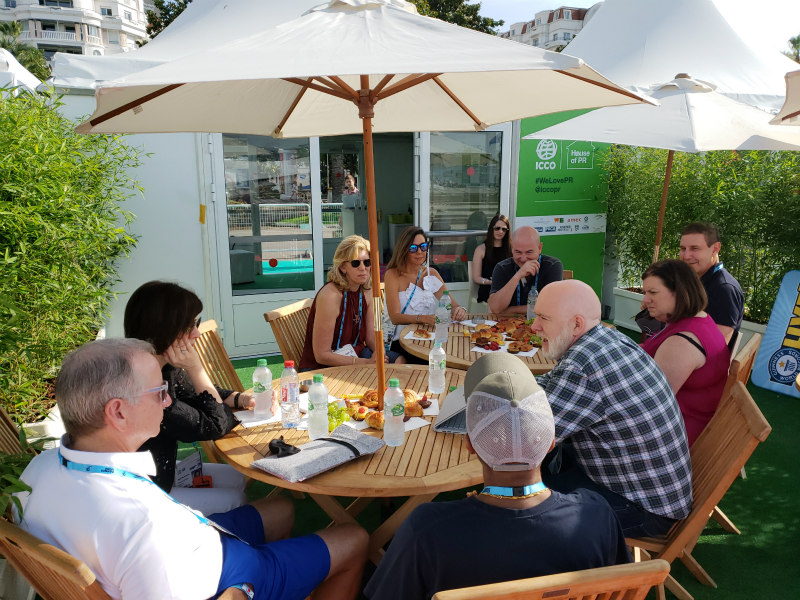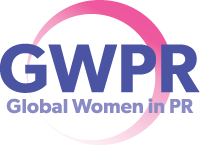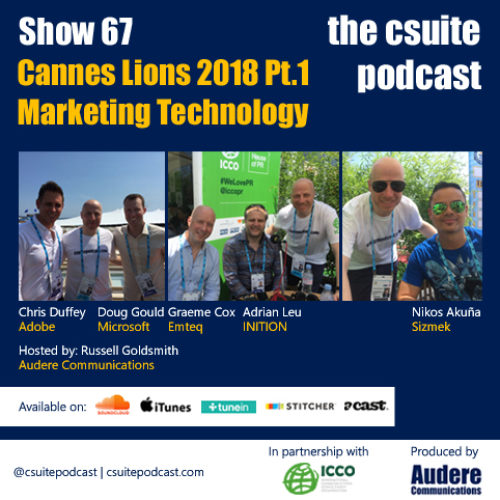Cannes: Industry CEOs On Opportunities & Threats For PR
The Holmes Report’s annual CEO breakfast discussed the growing influence of technology in the marketing arena, the need for empathy and human insights and, of course, the continuing struggles of the PR industry, even as “PR ideas” dominate.
Every year, The Holmes Report brings together public relations industry luminaries on the morning after the presentation of the Cannes PR Lions to discuss what we have learned from this year’s Festival of Creativity. This year’s roundtable discussion took place at ICCO’s House of PR and was as lively and wide-ranging as ever.
We discussed what inspired us at Cannes this year. We discussed the growing influence of technology in the marketing arena, the tyranny of algorithms, and the tension between technology and creativity and between technology and consumer privacy. We discussed the need for empathy, and human insights.
And of course, we discussed the Cannes Lions, and the continuing struggles of the PR industry, even as “PR ideas” dominate.
What follows is a transcript that has been extensively edited for length and clarity, but which provides an overview of the discussion between some the industry’s most senior executives and most provocative thinkers.
Paul Holmes, founder, The Holmes Report: So this is the fifth time I have moderated one of these breakfasts, the morning after the PR Lions, and I’m tired of talking about how dismal the performance of the PR agencies was, so I thought we might do things a little differently this year. So I thought I’d look at Cannes—and why you guys are here—a little more broadly. So what’s the most inspiring: the work, the people, the ideas?
Barri Rafferty, CEO, Ketchum: I pick the sessions I go to based on the people. Not the celebrities necessarily, because I don’t find them as inspiring as some of the industry creatives I see here. And I was particularly excited to see some of the stuff coming out of China and other different parts of the world.
Lynne Anne Davis, president, Asia-Pacific, FleishmanHillard: Some people are born geniuses and some people can come to understand what genius is. For me and for many others, that’s what Cannes is all about. I come here for what other agencies and other industries are doing in other markets all around the world. You get so much stimulation and so much inspiration.
Richard Edelman, CEO, Edelman: I spent three hours at some of the China presentations and some of the path-to-market ideas they were discussing, and they know when and why one of you is going to choose a particular kind of shampoo and another one of you is going to choose a different brand. I heard someone say, I can tell you when a guy is going to propose. He starts drinking more, he leaves less money on tips, and I can make sure he sees an ad for a ring from one of my clients.
Alan VanderMolen, president, international, WE Communications: The tension I think is most interesting is between technology and creativity, and where to brands live in that conversation. It’s become more clear in recent years, as Google and Facebook have established themselves as major forces in the advertising industry, and have attracted criticism for the power they wield, that brands are going to play a role in moderating between tech and humanity. We explored some of this during our session on Tuesday, which was a battle between technology versus human.
RE: I think we have to be helping consumers understand the trade-off between convenience and privacy, for example, and finding the ethical way forward, like [Unilever CMO] Keith Weed’s position on influencers, for example.
John Seifert, chief executive, The Ogilvy Group: I think it’s interesting that we are not having that same conversation about PR and advertising, but we are talking about how do we build relationships in this fragmented reality. This feels like a tipping point for Cannes, with the shrinking audience and questions of its continuing relevance. But there are critical issues out there. I was on a panel with three clients, and all of them were horrified by the algorithmic reality we are living in and what that means. And all of them—there’s not a client conversation I have that doesn’t get into that whole issue of the growing trust gap.
RE: Trust was a corporate reputation issue when we started our research. It’s now a brand issue.
PH: So it seems to me that we are seeing more and more technology driving more and more activity here. The word ‘programmatic’ has become part of the vocabulary of marketing. Google and Facebook have a huge presence here. And what we have always sought to bring to the table is empathy. Do we need that empathy more than ever to make sure the technology doesn’t become the only driving force?
Gail Heimann, president, Weber Shandwick: I think we need to find a symbiosis between the two. We are going to need the two together to propel brands and businesses forward.
LAD: The intersection of those two things is a wellspring of opportunity. The best campaigns are at that intersection. We have all these new channels and new technologies but they don’t come with a playbook about how brands should use them and we have to help them figure that out.
AVM: One question is where the regulation of all this is going to come from. Government can’t respond to all the changes fast enough. We have seen the shortcomings of self-regulation.
PH: I think one thing we’ve seen in recent months is that transparency is irrelevant if people don’t know what to do with the information they have, that sunlight is not always the disinfectant we always thought it was.
BR: I think you are seeing a cry for more consistent global regulation, and more self-regulation. That has been one of the themes at Davos in recent years.
AVM: This is where we have an opportunity. It’s time for brands to focus on their values, and stick to those values as they use all these new technologies.
JS: I completely agree. If the pace of change in technology continues, no regulator can keep pace. And so we have to have a principles-based model.
RE: There is going to have to be an explicit agreement between brands and consumers in terms of privacy, for example: this is what I want, and this is what I am prepared to give up in return.
AVM: There are two books I have been talking about to everyone recently. One is called ‘Weapons of Math Destruction’ by Cathy O’Neil which is focused on the dark side of big data and algorithms, and the other is ‘The Master Algorithm’ by Pedro Domingos.
GH: I think we need to understand that the next generation, Generation Z, will not look at these issues the same way we do. They might have a fundamentally different approach.
BR: Will there be a tipping point on privacy?
PH: We’ve had some interesting tipping points in the last year. The #metoo movement, for one. Maybe the Parkland shooting on guns. Maybe what we’re seeing on immigration right now. That raises another issue for me, which is whether part of our job has to be to anticipate those tipping points.
BR: In all of those cases, I think it’s been about human storytelling. Or it’s been about visual images, like the Time magazine cover…
PH: That’s interesting, by the way. It’s been analog media, like a magazine cover, or ProPublica’s audio recording on kids in cages, analog media driving the viral social media.
BR: … those tipping point moments are at the heart of what we do.
GH: We will get better at predicting them, I think.
PH: Is that about human insights or technology?
RE: If you look at the winning campaigns last night, one that I loved was the FleishmanHillard campaign for Budweiser. And it was driven by human understanding of an issue, not technology.
LAD: Anheuser-Busch has been doing that for 25 years, changing their production line and providing water to places where there was an emergency. What we did this year was focus more on reaching out to the communities to let them know how to access the resources we were providing and on reaching out to employees in affected communities and to all of our employees, who knew they had colleagues in Houston and other places that were affected.
AVM: One of the best campaigns I saw—I don’t think it was in the PR category—was from Brazil, where the mayor of Rio came in and he wanted to get rid of all the graffiti around the city, he wanted to literally paint the city gray, and so all the graffiti was removed. And Amazon came in and they projected graffiti onto the walls, quotes from famous books, and they offered those books to people at the same time. That was a great example of a human insight and creativity powered by technology.
GH: If you look at this festival, it used to reward the 30-second spot or the 60-second spot. I was on the Titanium jury [for work that doesn’t fit into traditional categories] this year, and almost everything we saw was a PR idea. If we do a better job of claiming what is ours, this is a great time for PR.
RE: We have to claim the right to go to Mars for Skittles. That was a great idea, but it should be the kind of idea that is generated and executed by the PR agency, not just the ad agency.
PH: So it looks like we are going to do this after all. So I want to say a couple of things about the PR winners. The first is that I agree with Richard, if PR ideas are winning, PR agencies should be winning more. Right now, we are being credited with a supporting role, which is kind of like playing a stormtrooper in the Star Wars universe when we should be aspiring to be George Lucas.
I also think that we need to focus more on true public relations. I think what distinguishes public relations is that focus on relationships and a lot of what we’re recognizing—the Skittles campaign is an example of this—is transactional. There’s a place for that, and it’s often great work, but the real value that PR adds is in building long-term, sustainable relationships.
That for me is what the Fleishman campaign did. There are customers who will be loyal to Anheuser-Busch for the rest of their lives because of what the company did last year. There are employees who will be loyal for life because the company stepped in and made a difference when it mattered.
RE: If you want to change that, you need to discuss the jury. That view of public relations is a very sophisticated, developed world view. For a lot of people in developing markets, PR is still very transactional, very short-term. And out business is very global, it’s 50% US and 50% international, which is different from the ad agencies, many of whom get two-thirds of their income from the US.
LAD: That’s about budgets. It’s not about creativity.
PH: I don’t know, Richard. I speak in developing markets, and there are always people who are excited that someone else shares their view of what PR should be. And I speak in the US and the UK and there are people who are just focused on publicity…
AVM: A lot of the best work I saw this week came from markets like Brazil, or Colombia.
GH: I just think that on a macro level there’s a short-termism, driven by the financial markets and what’s going on with CEOs, where turnover is faster than ever. Public relations that’s about long-term relationship-building is a challenge when we are all living in a short-term world.
BR: I think a bigger issue is that our percentage of overall entries is going down. You have to be in it to win it.
JS: I do think there’s a structural trap in how buyers think about the offering. There are firms like Edelman and Weber Shandwick and others that are getting beyond that, but as long as you are focused on in-house PR people and PR budgets you are limiting yourselves. You have to be in the CEO’s office, and the CMO’s office, and in HR. Then you are in a different conversation. But even so, it’s not just PR agencies that are struggling. It’s harder and harder to get organizations to buy big long-term brand-building ideas, to build sustainable brands.
PH: But isn’t that what the increase of “PR ideas” winning awards at Cannes is about? I think what Dove did 20 years ago or whenever, that has changed how a lot of marketers think about purpose-driven brands, and PR ideas, and sustainable brand-building?
JS: Think about Dove. In 1996 it was a bar soap. Now it’s one of the biggest personal care brands in the world, because it has committed itself to an idea. The brand now stands for something much bigger than itself.
RE: If you look at the deal between Dove Real Beauty Productions and Shonda Rhimes, that was an Edelman idea. It’s one of the things PR can do well because we are focused on trust, and we are focused on relationships. And we are fast. We have to be fast.
GH: I do believe we are catching up. We are coming up with plenty of ideas that are just not Cannes-centric ideas. They win elsewhere but maybe they don’t win at Cannes.
LAD: Creativity in PR sometimes just looks different than creativity at Cannes.
GH: We often come up with long-term ideas with lots of moving pieces, and that doesn’t always work here.
BR: One thing that’s really encouraging is that we are all competing in so many categories outside the PR category: social and influencer relations, experiential, and more. We won 28 Lions this year in different categories.
AVM: I think there are two things: confidence and competency. We are building competency. We can play on a bigger stage, we just need to make sure we have the confidence to elevate ourselves outside of the earned media world, and just focus on solving problems with creativity, in ways that are platform-agnostic.
PH: I have one last question, which is whether anyone else felt like Cannes this year was a little disconnected from the world beyond the Croisette? If you look at what was going on all week in the US, with families being torn apart and children being put in concentration camps, and I don’t think I heard that mentioned once, even with all the discussion around purpose and diversity. Did it strike anyone else as a bit irrelevant?
BR: I think a lot of people come here with their canned presentations that they’ve been rehearsing for week and it’s like they’re in that bubble.
RE: But that’s our big opportunity. It’s one way we could have a bigger voice. I was on stage with [Grey’s Anatomy actress] Ellen Pompeo, and she talked about how she took a stand when Laura Ingraham told LeBron James to ‘shut up and dribble.’ That’s where we are, where business meets those issues. That’s our opportunity.
JS: It’s not just the US-Mexico border. This is a global conference, and it’s a global refugee crisis that we are dealing with. There are 2 million people at risk in Syria right now. There’s an ongoing challenge with people fleeing wars in Africa.
RE: We should be working with NGOs next year, bringing them to Cannes and talking about these issues.
JS: There’s a lot of talk about the convening power of Cannes. We can bring a powerful group of creatives together to hack the problem. We are talking about the need for empathy, and brands that need purpose, and this is where PR really can play a role.
PH: That’s a great note to end on, everybody. Thanks for your time, and for a really lively discussion. We’ll see you all here next year.
You can read the original article here.





